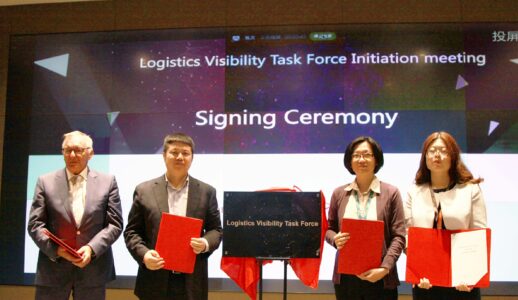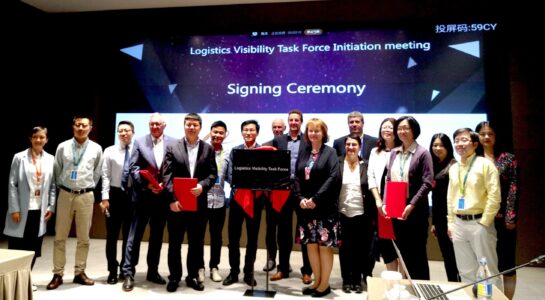Logistics Visibility Task Force
Alibaba, LOGINK and IPCSA collaborate to build a global intelligent logistics network – the Logistics Visibility Task Force
Photo: Xuemei Gu, CTO of Cainiao (second from right); Hongru(Judy) Zhu, head of Alibaba Standardization Department (first from right); Jianfeng Dai, head of LOGINK (second from left); Hans Rook, chairman of IPCSA (first from left), who jointly launched the Logistics Visibility Task Force.
Alibaba’s vision is ‘global buy global sell’. In 2018, as part of that vision, Alibaba agreed with LOGINK and IPCSA to promote the construction of globally intelligent logistics, in order to achieve global package delivery goals of 72 hours.
On 17 October 2018, the Logistics Visibility Task Force initiated by Alibaba, LOGINK and IPCSA held its opening ceremony and first meeting at the Alibaba Xi’xi Campus in Hangzhou, China. Participants included Cainiao CTO Xuemei Gu, Head of Alibaba Standardization Department Hongru(Judy) Zhu, Head of LOGINK Jianfeng Dai and Chairman of IPCSA Hans Rook. Jointly they unveiled the Logistics Visibility Task Force. Experts from DAKOSY, Hamburg, Germany; Portbase, Rotterdam, Netherlands; Port of Antwerp, Belgium; and DAGANET of Malaysia participated in the meeting and witnessed the establishment of this important global initiative.
LOGINK is a non-profit, open and shared public logistics information network led by the Chinese Ministry of Transport.
An internationally recognised association of electronic exchange platforms which include Port Community Systems, Cargo Community Systems, Sea and Air Port Authorities and Single Window Operators, IPCSA has members operating in more than 40 countries across the globe and is expanding rapidly.
Ms Zhu Hongru(Judy), Head of the Standardization Department of Alibaba Group, said: “Alibaba with the Cainiao Network, LOGINK and IPCSA will work together to build the Task Force into a platform for international logistics information sharing which will also inform the development of standards and promote collaborative working. The outputs of this work will inform ISO standards and become industry de facto standards, which will be used in the construction of global smart supply chains.”
Mr Dai Jianfeng, director of LOGINK Management Centre, said: “The establishment of the Logistics Visibility Task Force is a model for LOGINK to strengthen cooperation with large enterprises and organisations, and also an important collaboration for promoting international logistics information sharing and cooperation.”
Mr Richard Morton, IPCSA Secretary General highlighted IPCSA’s practical experience, and the fact that its members are already trusted third parties within maritime, aviation and logistics information sharing. He said: “We welcome the opportunity to work with platforms like Alibaba and LOGINK to create a more efficient global intelligent logistics network.”
Technical standards promote full link visibility of logistics supply chain
Ms Gu Xuemei, Cainiao Network CTO, said: “Standards have become ‘the universal language of the world’, and logistics technical standards are an important way of information sharing among logistics partners.” Cainiao Network hopes to “cooperate with industry chain logistics partners to build a global logistics technology standard, promoting visibility in the logistics supply chain”, she said.
“Full supply chain visibility of logistics means that when users purchase goods from other countries around the world online, they can track in real time where the package is located, which makes it easier for users to shop across borders, and facilitates the flow of information in the global logistics system”, she said, which means that buyers can buy more confidently.
Statistics show that the rapid development of e-commerce online shopping festivals such as the “Double Eleven” Festival has supported the flourishing of the express logistics industry. In 2017 alone, China’s express delivery business reached 40.06 billion pieces; business income was close to 500 billion RMB.
However, in the global logistics network construction, fragmentation of logistics information is still a problem, said Mr Liu Dapeng, Standards Project Leader of the Task Force. “The current situation is that regional logistics information service systems (LISS) can provide information about the main logistics chain (such as ports, airlines, etc.), but there are still many problems in information sharing between LISS systems. Although each LISS has already followed the related standards such as ISO and UNCEFACT standards, the information sharing between LISSs has not yet formed a unified international standard.”
IPCSA Secretary General Mr Richard Morton explained that the work IPCSA had already done in the creation of its ‘Network of Trusted Networks’ formed the basis for information sharing amongst its members. “IPCSA is delighted that this is expanding with this new alliance in the form of the Logistics Visibility Task Force.”
The important starting point of international logistics information sharing and cooperation
Industry experts point out that the efficiency of logistics urgently needs logistics standardisation. Only by realising logistics standardisation can we effectively implement the scientific management of logistics systems, promote the construction of a global intelligent logistics network, and effectively reduce logistics costs. There are standards available and widely used but this task force will focus on how electronic exchange platforms can exchange that information across borders.
Photo: Experts from DAKOSY, Portbase, Port of Antwerp and DAGANET participated in the meeting and witnessed the unveiling and establishment of the Logistics Visibility Task Force.
At present, the user of logistics information needs to obtain the required logistics information conveniently and reliably. The provider of logistics information wants to share the logistics information in a controlled and safe way. The meeting discussed how to meet this demand. Delegates from DAKOSY, Portbase, Port of Antwerp and DAGANET shared their practical experience on how to ensure reliable and safe logistics information sharing by their respective Port Community Systems and Single Window Logistics Platforms.
Mr Wu Yizhou, deputy director of LOGINK Management Center, said: “LOGINK provides a unified window for China’s logistics information development. By building an exchange network based on technical standards, we will work together with all parties to develop international logistics information platform information exchange standards through the platform of the Logistics Visibility Task Force.”
At the May 2018 global intelligence logistics summit, Jack Ma said Cainiao Network would go all-out to build the national intelligent logistics backbone network, part of which was to build a 24-hour freight transport network in China to achieve logistics costs of less than 5%; another network is eWTP along The Belt and Road, which will achieve 72 hours on a global scale.
Open data show that, by 2017, Cainiao Network was serving 224 countries and regions around the world, with 200+ cross-border warehouses and 100+ cross-border partners.
“It is believed that through the standardisation and implementation efforts of the Logistics Visibility Task Force, the logistics visibility of Cainiao Network will be effectively promoted and solved,” said Mr Huang Zhemin, head of the international B2B product of Cainiao Network.
Download Logistics Visibility Task Force Press Release
For more information on this Visibility Task Force please contact:
Alibaba Group
Dapeng (Max) LIU, Standardisation Department,
LOGINK
Huiting(Alice) YANG, Public Service Department,
IPCSA









